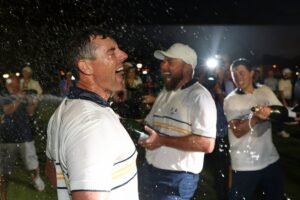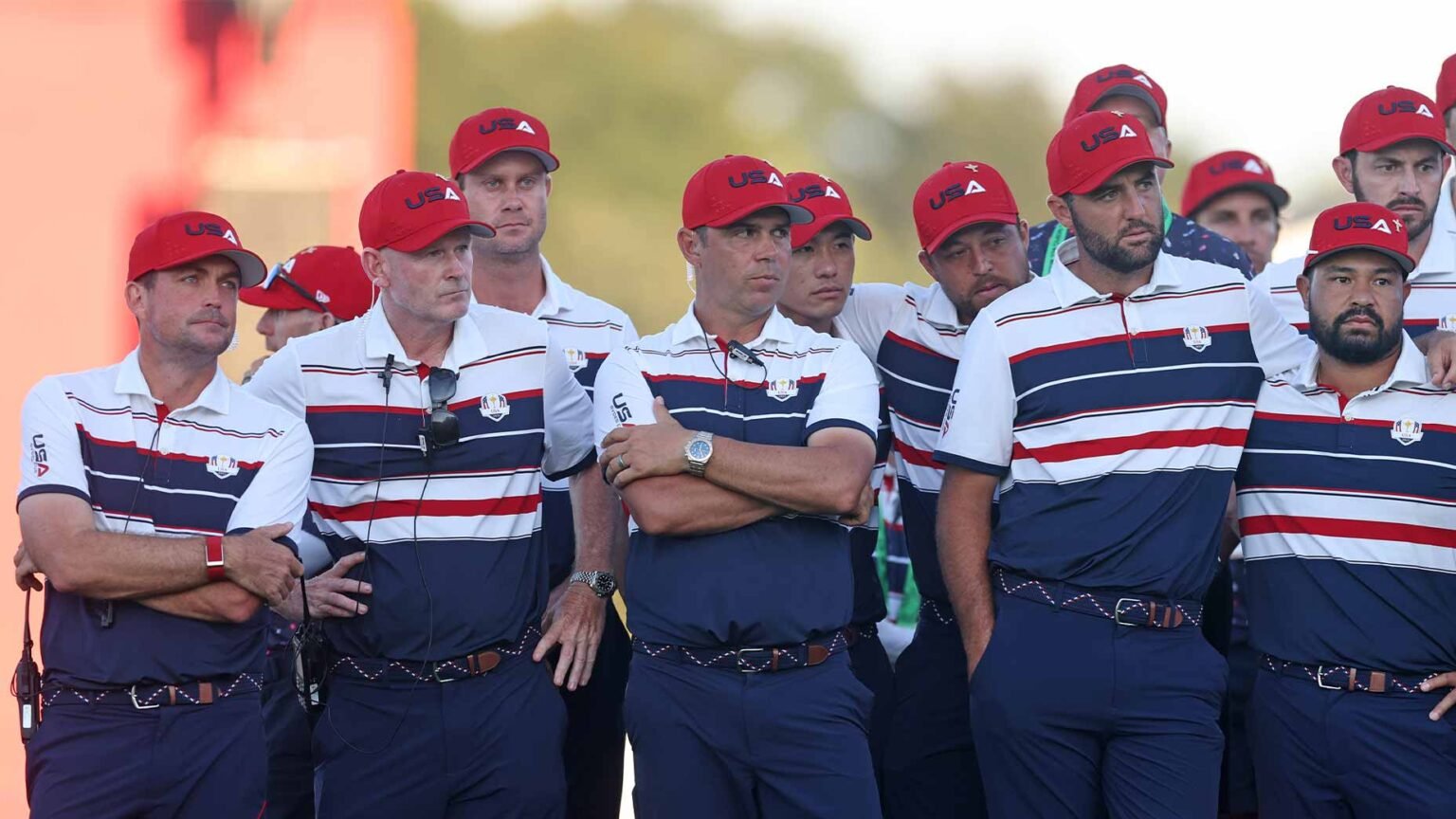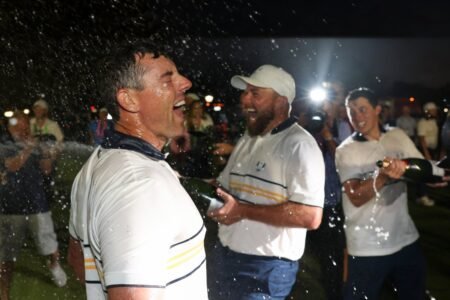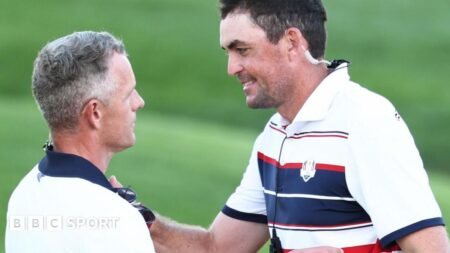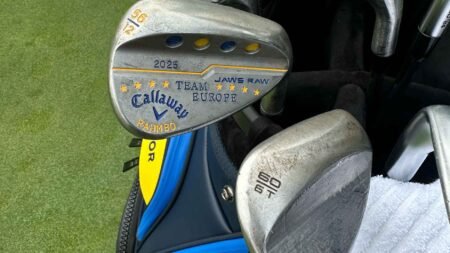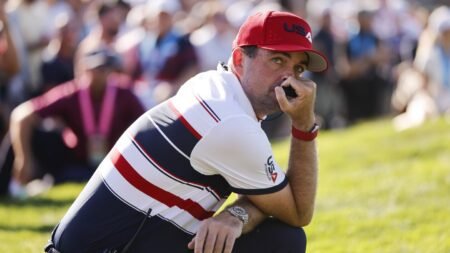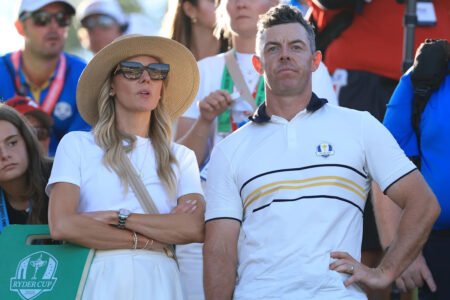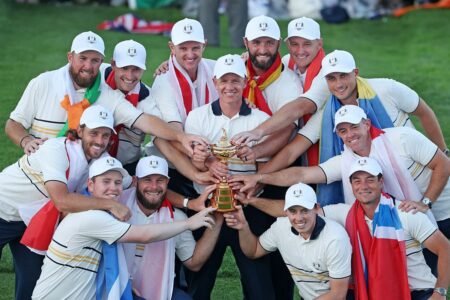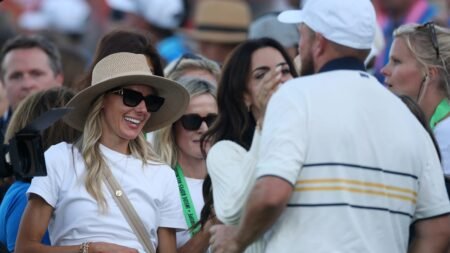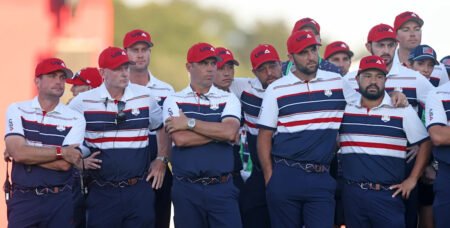FARMINGDALE, N.Y. — When this Ryder Cup disappears into the sands of time, it will be easy to remember how close things really got.
It will be easy to point to the scoreboard, 15-13, and to remember the valiant American comeback that put a real scare into the Euros. On the whole, the loss will seem small and explainable: Things came down to a few captain’s decisions, a high-variance style of golf, an unexpected course setup, and luck.
All told, the Americans won or halved all but one of Sunday’s singles matches, erasing a massive deficit and bringing the Ryder Cup to the brink of the largest comeback in the event’s history. In the end, they lost the Cup on the last hole of the eighth match of the day, when Shane Lowry’s 10-foot birdie putt found the bottom of the hole and gave the Europeans the half-point needed to retain. It was longer than anyone — even the competition — expected the U.S. to hang around on a Sunday that started looking like a bloodbath, and ended feeling much differently.
“To be honest, no,” Lowry said, when asked if he expected he’d be the decisive point. “I didn’t envision myself going up the 18th needing a birdie to retain the Ryder Cup. It was, yeah, like the worst two hours of my life. It was horrible. It was.”
But hidden in Lowry’s answer is a kernel of truth that speaks to a much broader U.S. failure: The final two hours of Lowry’s singles match against Russell Henley on Sunday afternoon were the most discomfort he felt all weekend at Bethpage Black. That is reflective of this week’s uncomfortable — and unfortunate — truth: In nearly all ways, this U.S. Ryder Cup was a spectacular letdown.
It will be easy (and tempting) to focus on just one area of the U.S. debacle: the leadership, the players, the stars, the crowd, the environment. It will be harder to remember that, from up close, the reality wasn’t nearly as simple. This American team was not just beaten at Bethpage, it was beaten everywhere, and in nearly every way.
The biggest failures took place on the course. For the second straight Cup, a talented U.S. roster was roundly stomped in the team sessions, looking discombobulated and listless against a European onslaught. Depth was a problem again for the Americans, who saw a whopping one-third of the roster go winless at Bethpage, but the American star power wasn’t much better (save Xander Schauffele and brilliant rookie Cameron Young). Scottie Scheffler became the first player since Peter Alliss in 1967 to go 0-4-0 in the first four sessions of a Ryder Cup, while Patrick Cantlay and Bryson DeChambeau played five sessions each and emerged with three combined points.
“It was probably one of the lowest moments of my career,” Scheffler said of the final loss of his 1-4-0 week.
Scheffler watched from up close as the U.S. lost each of the Cup’s first four sessions, outclassed and out-birdied by a European side that looked better prepared and more comfortable in the match play format. That, too, was part of the letdown: Captain Keegan Bradley and the U.S. team seemed to struggle with the minutiae of roster and pairing management, sticking to a “plan” for alternate shot that included datagolf’s last-ranked option (Harris English/Collin Morikawa, 0-2-0), and necessitated a player-driven flip of odd-even holes in the Scheffler/Russell Henley pairing. These decisions were at least defensible for Bradley, whose players might have lost no matter their order, arrangements or opponents. The same could not be said for the decision to set up Bethpage Black for a birdiefest, trimming the rough to heights lower than typical public play and leaving the greens as soft as day-old butter, which seemed to benefit the Euros significantly more than the Americans.
“Obviously it wasn’t the right decision,” Bradley said. “I definitely made a mistake on the course setup. I should have listened to my intuition.”
Wound up next to Michael Jordan at Bethpage as Tyrrell Hatton poured in a birdie to go 3-up on Bryson and JT.
His Airness summarized the morning session nicely.
“We got problems.”
— James Colgan (@jamescolgan26) September 26, 2025
Bradley was not the whole problem as captain, and yet his decisions helped pave the way for a dream European week. The Euros seized momentum almost immediately after Friday’s foursomes pairings started, zapping momentum from a crowd that would spend the rest of the weekend oscillating between restless and unruly. Things reached a head on Saturday afternoon with a series of pathetic insults hurled mostly in the direction of the Irish duo of Rory McIlroy and Shane Lowry.
The crowd situation was more nuanced than an angry mob, but not by much. Whether a few bad apples or a few too many, the display pumped oxygen into a series of ugly stereotypes about New Yorkers, New York golf and the decision to bring the Ryder Cup to a municipal course. The Bethpage faithful should be embarrassed by the display, as should the PGA of America, which failed to adequately train its marshals and security staff to sniff out the problem. The players, as Justin Thomas pointed out, also bear some responsibility for amplifying the frustrated environment with a mostly uncompetitive showing.
“Cam and I said to Shane and Rory yesterday that we felt for them,” Thomas said Sunday. “Cam and I just wished that we gave them something to cheer for instead of people to cheer against. I think that was kind of the main consensus of the last two days, that we weren’t giving them enough to cheer for, and they were just trying to help us win.”
This, it seems, was both the first and final failure of this Ryder Cup: A failure of soul. From the first announcement of a Ryder Cup at one of America’s true golf havens of accessibility and affordability through the final day of $750 per ticket competition, the Bethpage Ryder Cup seemed to fundamentally misunderstand itself. The point of hosting a Ryder Cup at one of America’s purest venues was not to set records for ticket revenue or hospitality offerings but rather to provide one of the loudest and most passionate golf fanbases in the world the chance to raise its voice. The goal was to bring one of golf’s greatest events to the real golfers of New York. In the end, this Ryder Cup got neither.
Those 40 minutes of glory on Sunday afternoon mattered. They made this Ryder Cup close, and for a second, they gave us a glimpse into this weekend as it should have been: loud and raucous and accessible and fun. But before entering another momentous event at Adare Manor in Ireland in two years, we would do well to remember the three days — and two years — that preceded this week.
Maybe then we can remember that these Americans are not close. There is work to be done, and on Sunday night in Bethpage, there are no easy answers.
You can reach the author at james.colgan@golf.com.
Read the full article here

